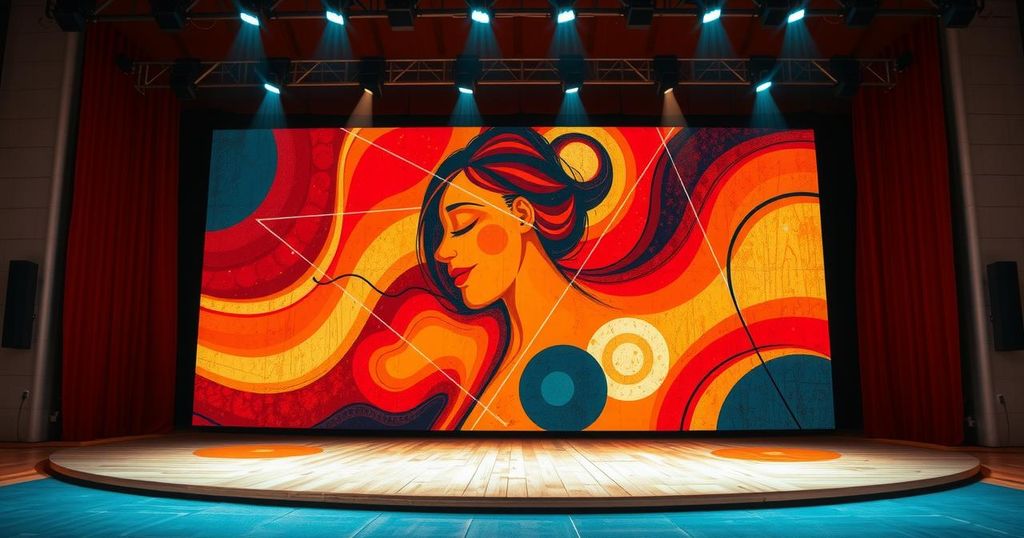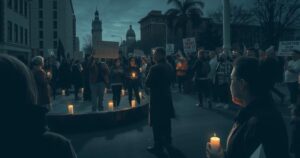Lebanon’s Theatrical Resurgence: Art as a Beacon Amidst War’s Shadows

Lebanon’s theatres are returning, showcasing works influenced by last year’s war. Artists like Ali Chahrour and Fatima Bazzi are incorporating their experiences of conflict and migration into their plays. Despite ongoing economic struggles, they strive to convey poignant stories of resilience and hope through art, reflecting the realities of a war-torn society.
As Lebanon grapples with the aftermath of last year’s war, the local theatre scene is undergoing a notable resurgence. The conflict, fought between Israel and the militant group Hezbollah, deeply affected the nation, yet it also inspired artists like Ali Chahrour, who steadfastly continued to create during tumultuous times. Chahrour has debuted a performance in Beirut called “When I Saw the Sea,” focusing on the harrowing experiences of migrant workers during the conflict. Plans are already underway to showcase this piece at prominent stages across Europe, including at the esteemed Avignon Festival.
Chahrour, a 35-year-old playwright and choreographer, expressed, “This project was born during the war. I did not want to stop making theatre, because I do not know how to fight or carry weapons; I only know how to dance.” His work features two Ethiopian domestic workers and a Lebanese-Ethiopian woman who share tales of exile and hardship, ultimately paying tribute to those displaced or killed during the war between Israel and Hezbollah. The play highlights the plight of migrant workers left vulnerable due to the violence, many of whom found themselves abandoned and homeless amidst the chaos.
In another significant work, playwright Fatima Bazzi presents “Suffocated,” shaped by her own displacement from her home in a Hezbollah stronghold in southern Beirut. Originally focused on the challenges of a woman’s relationship with her oppressive husband, Bazzi found herself needing to adapt the narrative based on her personal experiences during the war. Forced to flee to Iraq, she returned to Lebanon with a renewed commitment to her project, continuing rehearsals via video calls with her cast.
During a recent rehearsal, Bazzi remarked on the collaborative effort it took to maintain their connection throughout the conflict. The play creatively integrates elements of their experiences, such as when characters react to the sound of a bomb, capturing the blend of reality and performance. “Working on the play has allowed us to express the things we felt and went through, serving as an escape and therapy,” she shared.
Despite the revival of the theatrical scene, Lebanese theatre remains affected by the ongoing economic crisis that has beset the country since 2019. Omar Abi Azar, founder of the Zoukak collective, noted that their festival was postponed amidst the war but is now slowly regaining its momentum. His own play, “Stop Calling Beirut,” delves into his personal history and the memories tied to Lebanon’s civil strife, encapsulating loss and resilience.
Abi Azar, who formed the collective following a previous war in 2006, emphasized the intrinsic link between the art they create and their collective experiences of conflict. He stated, “We are children of war. We were born, raised and grew up in the heart of these crises.” He maintains that their history is neither a burden nor a challenge, but simply their reality. “If this reality wanted to pull us down, it would have dragged us, buried us and killed us a long time ago,” he noted, finding hope through art.
The revival of Lebanon’s theatres not only represents a cultural comeback but also serves as a poignant reminder of the resilience and creativity of its artists amidst the echoes of war. Exposing raw emotions and stories of hardship, this fresh wave of theatrical works shines a light on issues of migration, oppression, and the quest for healing amid chaos.
In conclusion, the resurgence of theatre in Lebanon, influenced by last year’s war, showcases the power of art to heal and reflect societal struggles. Playwrights like Ali Chahrour and Fatima Bazzi are not only reviving the art form but are also channeling their experiences into narratives that address the harsh realities faced by many. Despite economic challenges, Lebanese theatre persists, driven by the spirit of resilience and the desire to give voice to the marginalized. This vibrant artistic revival stands as a testament to the enduring will of those shaped by conflict.
Original Source: www.france24.com





